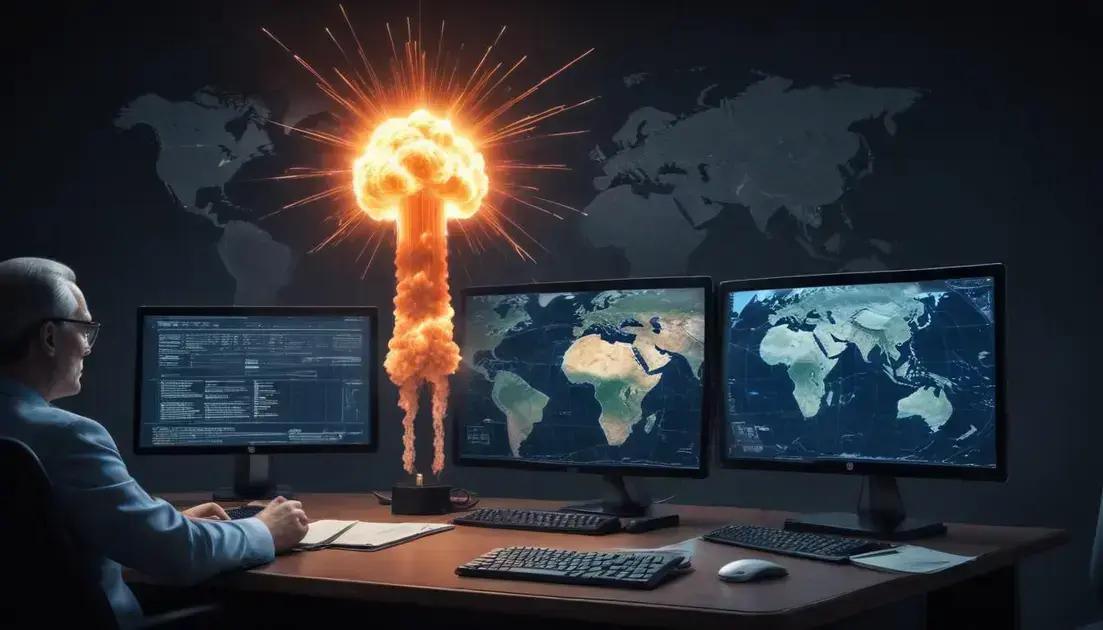
The New Nuclear Weapon
The rise of data significantly impacts global geopolitics and security, transforming how nations interact and prepare for conflicts. As countries harness data for decision-making, they can predict threats and shape defense strategies effectively. However, this reliance on data also introduces risks, such as privacy concerns and cyber warfare. Understanding these dynamics is crucial for navigating the future of warfare, where data analysis and technology play a pivotal role in national security.
Data power is a key player in today’s world, shifting how nations strategize and protect themselves. Ready to dive into the intricate webs of geopolitics? Let’s explore!<\/p>
The Rise of Data in Geopolitics
The world is changing fast, and data is at the heart of these changes. Countries are realizing that having the right data can mean having real power. This rise of data in geopolitics is reshaping how nations interact with each other.
Why Data Matters
Data can provide insights into trends and behaviors. It helps leaders make informed decisions about their strategies. By understanding global connections, countries can better position themselves on the world stage.
Examples of Data in Action
For instance, governments use data to track economic indicators. These indicators can indicate when to invest heavily or hold back. Similarly, intelligence agencies rely on data analytics to assess threats and make quick decisions.
The Competitive Edge
Countries that excel in data mining and analysis can gain a significant competitive edge. This means not just collecting data, but also knowing how to use it effectively. A well-informed nation can anticipate challenges and respond swiftly.
Challenges Ahead
Despite the benefits, there are challenges. Data privacy concerns are rising, and unethical data usage can lead to conflicts. Countries must navigate these issues to maintain trust and cooperation.
Nuclear Weapons: The Data Connection
Nuclear weapons are a serious concern worldwide. Data plays a big role in managing these threats. By analyzing data, countries can monitor nuclear arsenals and understand potential risks.
The Role of Intelligence
Intelligence agencies collect vast amounts of information. This data helps track nuclear capabilities in other nations. It’s crucial for assessing whether a country might be developing new weapons.
Data and Nuclear Treaties
Data also supports international treaties. These agreements aim to prevent the spread of nuclear arms. Nations share data on their stockpiles to build trust and promote transparency.
Predictive Analysis
Data allows for predictive analysis. Governments can forecast potential threats based on past behaviors. This proactive approach helps them prepare for any scenarios that may arise.
Challenges in Data Collection
However, collecting reliable data isn’t easy. Nations sometimes keep information secret for security reasons. This lack of transparency can lead to misunderstandings and conflicts.
Overall, the connection between nuclear weapons and data is vital for global security. By leveraging data smartly, countries can navigate these complex challenges effectively.
Impacts on Global Security
The rise of data greatly impacts global security. Countries now rely on data to make critical decisions. This information helps them assess threats and respond more effectively.
Data-Driven Defense Strategies
Many nations use data to shape their defense strategies. By analyzing data trends, they can predict potential conflicts. This proactive approach enables better preparation and resource allocation.
Collaboration and Information Sharing
Data also promotes collaboration between countries. Sharing information helps build trust and strengthens alliances. When nations exchange data, they can work together to tackle common threats.
Cybersecurity Concerns
However, data reliance comes with risks. Cybersecurity threats pose serious challenges. If sensitive data is compromised, it can lead to significant security breaches.
New Dynamics in Warfare
The role of data is also changing modern warfare. Cyber warfare is becoming more common, with attacks targeting critical infrastructure. Nations must be vigilant and develop robust defenses against these threats.
Overall, the impact of data on global security is profound. It reshapes how nations prepare and respond to threats on the world stage.
Future of Warfare in Data Dynamics
The future of warfare is evolving, and data dynamics play a key role. As technology improves, data becomes vital in combat strategies. Armed forces increasingly rely on data for decision-making and strategy development.
AI and Automation
Artificial intelligence (AI) is changing how wars are fought. AI systems can analyze data quickly. This leads to faster responses during conflicts. Machines can help predict enemy actions and develop counter-strategies.
Cyber Warfare
Cyber warfare is rising as a significant threat. Nations are at risk from cyber attacks targeting infrastructure. Data protection becomes crucial to national security.
Information Warfare
Control of information is also vital. Misinformation campaigns can shift public opinion and destabilize governments. Data analysis helps identify these tactics and counter them effectively.
The Need for Preparedness
As threats grow, nations must be prepared. Investing in data analysis tools and training personnel is essential. Understanding how to use data can give a significant advantage in conflicts.
The combination of data, AI, and technology will shape future military operations. Vigilance in protecting data and understanding its implications will be crucial for national defense.
Conclusion: Navigating the Information Age
Navigating the information age is a challenge and an opportunity. Data is everywhere and shapes our lives. It influences how we work, communicate, and interact with each other.
Understanding the Impact
Every action can generate data. This data can be used for good, like improving services and products. However, it also poses risks, including privacy concerns and misuse.
Embracing Technology
Staying updated on new technologies is crucial. Using tools to analyze data helps individuals and businesses thrive. It allows for smarter decisions based on insights.
Promoting Digital Literacy
Digital literacy is vital for everyone. People should understand how to protect their data and use it responsibly. This knowledge empowers them to navigate the digital world safely.
Collaboration for Progress
Collaboration between governments, businesses, and individuals fosters innovation. Sharing best practices leads to better solutions in handling data and technology.
As we embrace the information age, being informed and proactive is essential. The future lies in understanding and harnessing the power of data for positive change.
Conclusion
In conclusion, navigating the information age is both exciting and challenging. Understanding data and technology is essential for everyone. When we embrace these tools, we can make smarter decisions and improve our lives.
We must also be aware of the risks, like privacy concerns. Digital literacy helps us protect ourselves and use data wisely. By working together—governments, businesses, and individuals—we can create a world that benefits us all.
So, let’s stay informed and proactive. The future is bright if we harness the power of data and technology for good.


